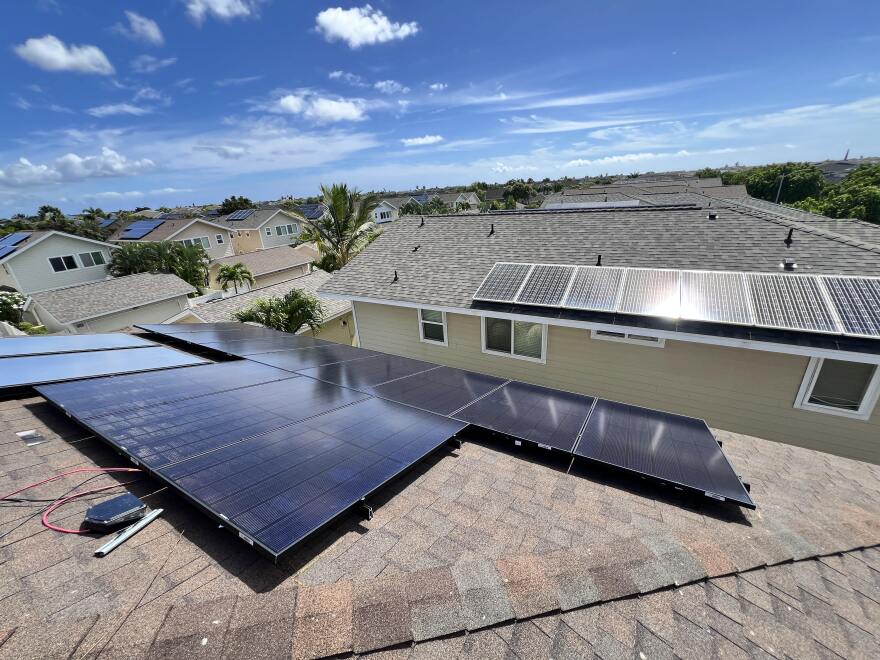The deadline to claim a major federal tax credit for rooftop solar is three months away. But for some Hawaiʻi residents, the window may have already closed.
The investment tax credit, which cuts the cost of new rooftop solar and storage systems by 30%, will be eliminated after Dec. 31.
In order for a system to be eligible for the residential tax credit, it needs to be fully installed by the last day of 2025.
According to different solar installers who spoke with HPR, installation can take anywhere from two to four months on the neighbor islands, and four to six months on Oʻahu, meaning residents who have yet to start the process may already be out of time.
Rocky Mould, executive director of the Hawaiʻi Solar Energy Association, said at this point, new customers can’t count on claiming the credit to help finance the cost of a new solar system.
“There are no guarantees you're going to get that tax credit going forward,” he said.
Solar companies are mostly booked through 2025
On July 4, President Donald Trump signed into law the One Big Beautiful Bill Act, which moved the end date for the tax credit up from 2032 to 2025.
The policy change spurred a huge rush in the residential solar market, and many solar companies are fully booked until the end of the year.
David Gorman leads the residential division of RevoluSun, which installs rooftop solar on Oʻahu. He said his company made six months’ worth of sales in July alone.
“And then we just had to kind of call it, because we were worried about taking on and committing to more than we were actually going to be able to do,” Gorman said.
Rising Sun Solar operates across Kauaʻi, Oʻahu, Maui, and Hawaiʻi. CEO Matias Bessaso said demand for residential solar has been exponential since midsummer, and the company stopped taking new clients weeks ago.
He added that it has been particularly hard to keep up on Maui. After the 2023 fires, Rising Sun lost several projects and had to downsize its workforce.
“Today, we are about a quarter of the size that we were two years ago, and demand is as high, if not higher, than it was at other times,” Bessaso said.

On Hawaiʻi Island, Blue Sky Energy owner Joshua Mason is working to build out his business’s capacity to try to meet the needs of new customers looking to get solar systems installed under the wire.
He’s also giving customers an out if their project misses the cutoff for the tax credit.
“Our commitment has been that if we were unable to get the project done this year, that they'd be under no obligation to complete the project in 2026,” Mason said.
Solar Kauaʻi, which is run by the Lucas family, is one of the few companies that told HPR it still has room for new residential customers.
Elliot Lucas said that Kauaʻi homeowners looking to install solar panels that generate less than 10 kilowatts of power can get expedited approvals for their permits.
But most of his customers opt for something bigger, which requires a more drawn-out permitting process. If a customer is just starting now, he believes it’s 50-50 if those systems will be completed in time to be eligible for the tax credit.
“If you wait another couple of weeks, I’d say it's a no-go completely,” Lucas said.
Solar industry looks ahead to 2026
The Hawaiʻi Solar Energy Association’s Rocky Mould said the elimination of the tax credit is a negative for customers and for the industry. But with Hawaiʻi’s high cost of electricity, he thinks rooftop solar still makes sense for many homeowners in 2026.
“Rooftop solar and energy storage combined really can help people reduce their energy costs, even without this 30% federal tax credit,” Mould told HPR.
Solar companies across the board echoed that sentiment, but also shared that they were bracing for a drop in business in the new year.
Some businesses said that they would try to absorb some costs to keep prices attractive to residential customers, while others said they planned to shift their focus to the commercial market.
But Solar Kauaʻi, which has been around for 45 years, isn’t planning any big changes to its business model.
“This isn't the first time that there's been ripples in the industry,” Lucas said. “We just kind of stay lean, and there'll always be something for us to do.”
Hawaiʻi Public Radio exists to serve all of Hawai’i, and it’s the people of Hawai’i who keep us independent and strong. Help keep us strong to serve you in the future. Donate today.






